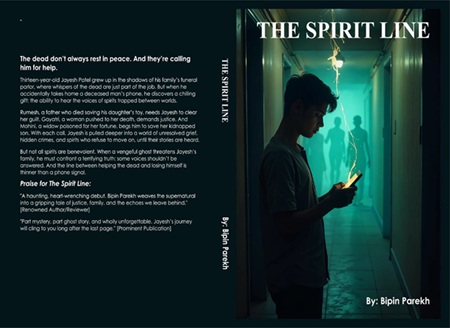In many stories, change arrives quickly; for Jayesh, it arrives quietly. The thirteen-year-old at the heart of The Spirit Line lives above his father’s funeral parlour, surrounded by rooms that hold grief and farewells. Days pass with routine and muted voices—until one small mistake opens a door he never knew existed.
It happens when he forgets to lock away the phone of a man who has already passed away. When it rings, Jayesh answers without thinking. The voice he hears is not meant for the living, yet it speaks to him. It is not a typical cry for help—on the line, a spirit asks to be understood. And in that single moment, Jayesh’s life begins to move in a new direction.
The Unexpected Weight Of Someone Else’s Truth
At first, it feels like an accident. A strange and fleeting encounter. But soon, more voices arrive—each with its own story, each with something left undone. These voices bring unfinished truths, not threats. They are voices carrying truths that never reached the people who needed to hear them.
One message comes from a father who wants his daughter to know she is not to blame for his death. Another belongs to a woman who needs the truth of her passing to be heard. These voices are not bound by time, but by what they have left unsaid. And now, their words rest in Jayesh’s hands.

Listening Can Be an Act Of Great Courage
In a world where action is celebrated, listening can be overlooked. But Jayesh learns that to listen—truly listen—requires its own form of bravery. He becomes a bridge between the living and the dead, carrying words that are heavy with meaning.
His father struggles to accept what Jayesh claims to hear. His mother, however, believes him. Between their differing views, Jayesh finds his own path, choosing to follow what feels right rather than what is easy.
Every Story He Hears Changes Him
Each call Jayesh answers brings more than a message—it brings a lesson. He begins to see how blame can destroy the living as much as loss. He sees how the truth, even when painful, can free the heart. He learns that silence is not the same as peace, and that sometimes the only way forward is to face what has been hidden.
Jayesh learns these lessons in the quiet moments alone with the spirits, when a single voice can change what the living believe.
The Spirit Line Is Not A Story Of Fear
Bipin Parekh’s The Spirit Line refuses to treat death as a spectacle. Instead, it approaches it with respect and compassion. This is not a ghost story meant to unsettle—it is a human story meant to connect. The presence of the dead is not there to haunt, but to remind us that some truths live beyond the boundaries of life.
In Jayesh’s journey, we see that compassion does not need grand gestures. Sometimes it is enough to believe, to carry someone else’s truth with care, and to ensure it reaches the place it belongs.
Bipin Parekh Writes With Purpose And Clarity
Parekh’s storytelling does not rush. He allows moments to breathe, letting emotions take their natural place in the narrative. His ability lies in showing that the extraordinary can happen in the most ordinary settings, and that even a young boy can hold a wisdom beyond his years.
The language is simple but rich, inviting readers to step into Jayesh’s world without feeling like outsiders. This is writing that trusts the reader’s ability to feel without needing to be told.
The Lasting Echo of A Quiet Choice
When the final page is turned, what stays is not the mechanics of Jayesh’s gift, but the heart of his decision to use it. He does not run from what he hears. He does not ignore the calls. In choosing to listen, he becomes a quiet keeper of truths, ensuring they are never lost to silence.
This is the kind of story that lingers—not because it shouts, but because it reminds us that listening can be one of the most powerful acts of all. And through Bipin Parekh’s words, The Spirit Line becomes more than a novel—it becomes a reflection on our own ability to hear what others choose to ignore.





























